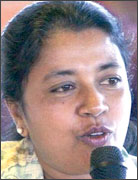|
Woman
Global recognition for healing scars of conflict
Visaka Dharmadasa turns personal tragedy into mission
to serve society:
|

Visaka Dharmadasa
|
The conflict in Sri Lanka has affected thousands of women on both
sides of the divide. It is not easy to heal the scars of conflict but
one woman has been spearheading efforts in this direction. Her own son
went ‘missing in action’, but she has overcome the immense sadness that
engulfed her to spread compassion to all.
She has earned international recognition for her groundbreaking work,
including the coveted InterAction Humanitarian Award recently.
When Visaka Dharmadasa’s son was reported missing in action while
serving in the Army, she discovered a passion for peace building she
never knew she had.
She is the founder and chair of the Association of War-Affected Women
and Parents of Servicemen Missing in Action, and Secretary of the Kandy
Association for War-Affected Families. She offers support, consolation
and advice to the families concerned.
Visaka has educated soldiers, youth, and community leaders about
international standards of conduct in war. She promotes the economic
development of women across conflict lines.
She has designed and facilitated Track II dialogue processes,
bringing together influential civil society leaders from both sides of
the conflict. She has even acted as an ‘invisible’ mediator in peace
efforts.
Among a variety of other commitments, she coordinates a programme on
war-affected women and designs workshops on rehabilitation,
re-integration, and reconciliation.
Women are highly interested in preventing, stopping, and recovering
from conflict. Women are motivated to protect their children and ensure
security for their families. They watch as their sons and husbands are
taken as combatants or prisoners of war.
Many do not return, leaving women to care for the remaining children
and elders. Since her son’s disappearance, Visaka has devoted her life
to forging bonds in her society instead of deepening rifts. By bringing
together the mothers of missing combatants, Visaka says she had come to
a deeper understanding of what it means to be human.
She has created a support network for war-affected women to share
their grievances, stories, and strategies.
“The problems facing the relatives of the missing vary from country
to country, depending on local culture and customs.
In certain societies, when a wife has to assume the role of head of
household, in addition to the financial or material difficulties she may
face, she can be spurned by her family or in-laws for, according to
popular belief, the widow is a harbinger of bad luck and as such risks
rejection by the community.”
Visaka has not seen her son since 1998. The young soldier was 21
years old when he fell into LTTE hands. “When a person dies, you bury
them,” explains Visaka. “You try to grieve, and then get on with life.
When someone disappears, you undergo a kind of psychological torture.
You can think of nothing else.”
She continues to believe, despite the years, that her son is alive.
With time, the pain of absence gets worse and the wound begins to
fester. The loss of her son has reinforced her determination to serve
the society in a more meaningful way.
Get the right glow with a facial
Irangika RANGE
 A facial is a remedial solution for various beauty related problems.
A facial, helps revitalise the skin and has become a popular treatment
today among teenagers and adults to get rid of blemishes, pimples, black
and white heads, sun burns, dark circles around eyes and wrinkles. A facial is a remedial solution for various beauty related problems.
A facial, helps revitalise the skin and has become a popular treatment
today among teenagers and adults to get rid of blemishes, pimples, black
and white heads, sun burns, dark circles around eyes and wrinkles.
Beauty Therapy Specialist Chameeliya Ramanayaka says most women pay
no attention to do facials when they are young but try it when they pass
the youth. But when a person just passes 20, many aging symptoms begin
to emerge. The skin becomes weary, wrinkles and fading of the complexion
begin to appear on the face and the neck.
“If you do not do the basic facials or at least clean ups after 20,
it will be difficult to retain the lustre of the skin,” she said.
Sun burn marks caused by ultra violet rays is the major problem among
Sri Lankan men and women. But it can be treated successfully through
facials. There are two kinds of rays, UVA and UVB. The UVA is an aging
ray which diminishes the skin while damaging connective tissue.
The UVA rays can react with the skin even if you are indoor. The UVB
is called a burring ray. It causes freckles and aging spots. There are
special ultra violet skin treatment which counter the damage caused by
ultra violet rays successfully.
She said the skin of teenagers is oily. Oily skin provides a good
background for black and white heads. This can be overcome by a special
treatment called mini facial.
It is also not advisable to expose the skin to the sunlight
immediately after removing all dead cells by a facial. It is recommended
to do a facial once a month because new skin cells are produced within
27 days.
The old cells get automatically removed on youngsters’ skin but it
remains on the skin when you age. That is why you need to do a facial
every month to nourish the skin.
The first step of a facial is to recognise the skin type. According
to the skin type a suitable cleanser can be selected.
She said sensitive skin can be allergic to certain skin care
products. Redness in the skin, sweating and skin irritations indicates
that the product does not agree with your skin. Make sure to choose the
right cleanser for your skin.
The skin types can be categorised as normal, combination, sensitive,
dry and oily. It can be easily identified through a skin test.
Normal skin:
This type is rare among Sri Lankans. The normal skin usually has no
dark patches or pimples. It has a good moisture balance.
Combination skin:
This skin type is common among Sri Lankans. It is combination of dry
and normal skin. Forehead, nose and mouth can be oily while cheek can be
normal to dry, in this type.
Sensitive skin:
This skin type can be easily identified. When you apply cream the
skin starts to sweat.
The skin can be reddish and swollen even by touching. It may also
turn dry with aging.
Dry skin:
White heads around mouth and nose areas can be seen. Most oil
producing glands are blocked and it is the reason for having many white
heads. It easily gets intensed with bacteria. Lines on the skin are
visible while expression lines are quite visible on the face. It shows
the aging look. Regular facials are recommended for this type of skin
while moisturising the skin more often.
Oily skin:
This type produces a lot of sebum and oil accumulated on the skin. It
forms black heads. Many black patches can be seen on the skin. When it
is too oily, bacteria get contacted resulting in more dark spots on the
face. The complexion is quite yellowish due to the good moisture
balance. It is recommended to do a facial once a month.
Next week: Basic
facial steps |

